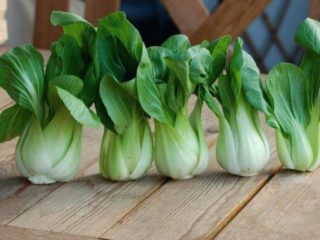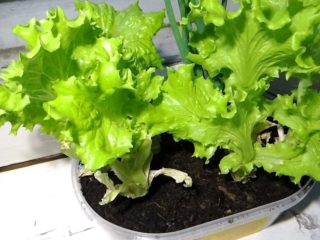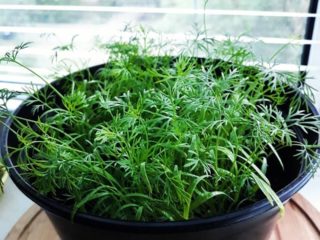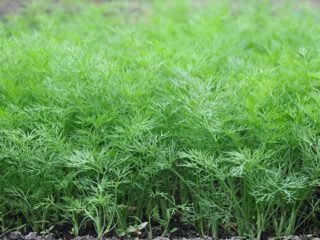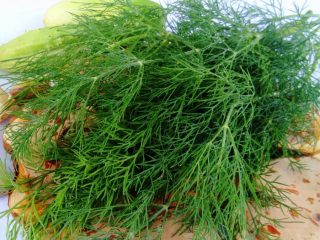Content
Growing watercress on a windowsill is an easy and affordable way to get delicious greens on your own at any time of the year. Watercress is an unpretentious but very useful plant that can be grown at home on a windowsill.
Features of growing watercress at home on a windowsill
The choice of this type of salad for home gardening is due to the ease of its agricultural technology and the benefits of this variety of cabbage plants. Watercress has a tart taste and low calorie content (33 kcal per 100 g).
Greens are rich in vitamins, folic and ascorbic acid. It has a beneficial effect on the functioning of the thyroid gland, gastrointestinal tract, and is recommended for bronchitis, anemia and cough. The substances contained in watercress stimulate the elimination of toxins, calm the nervous system and help with insomnia.
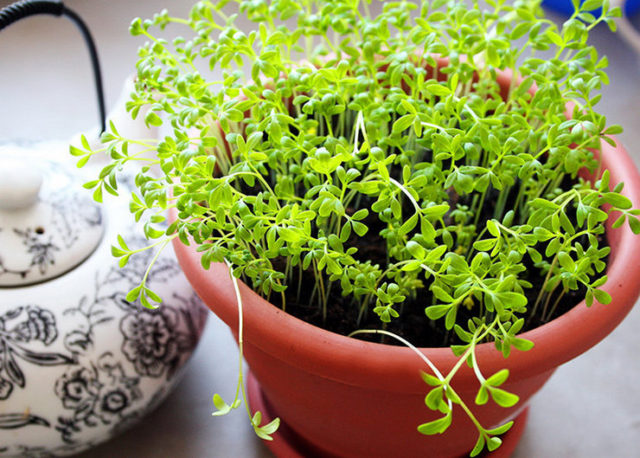
Greens contain many vitamins, essential oils and trace elements
Watercress is very beneficial for smokers as it can reduce nicotine cravings. It is also able to prevent severe asthma attacks, so its regular use is recommended for people suffering from these diseases.
The advantages of watercress, in addition to ease of care, include frost resistance and shade tolerance.
The first thing to do when deciding to grow watercress at home on a windowsill is to buy seeds. As a rule, they choose from the following 3 types:
- sowing;
- whole-leafed;
- curly.
The sowing variety up to 21 cm high is an early ripening crop with large leaves and the sharpest taste.
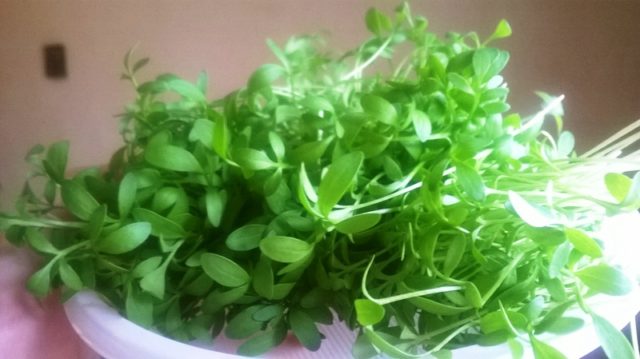
Seed watercress "Zabava" has a mild taste
Whole-leaved watercress is more in demand for growing on the windowsill, as it has a mild, piquant aftertaste. It has finely cut leaves and grows up to 15-17 cm.
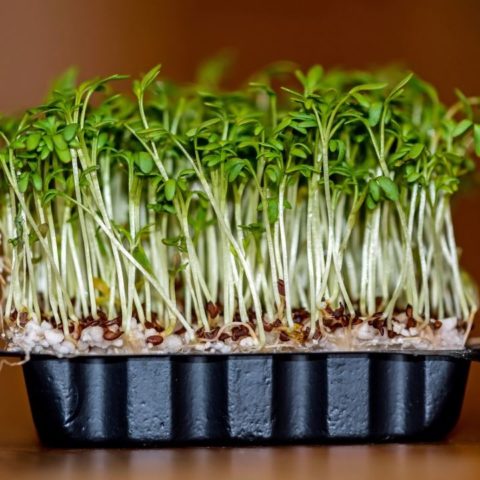
Dukat watercress greens can be added to salads and meat dishes
Curly watercress with the smallest leafy plates reaches 17 cm. Taste - sharp, slightly reminiscent of horseradish.
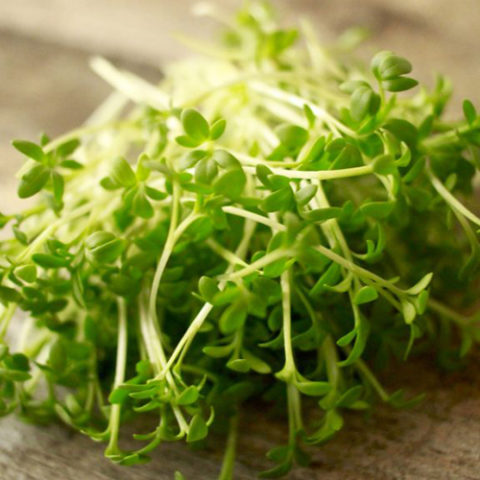
Greens of watercress "Azhur" can be used to decorate ready meals
The seeds can be harvested by yourself or purchased from a specialty store.
When buying seed, it is worth checking not only the expiration date, but also the integrity of the package.
Before planting watercress on the windowsill, you need to stock up on the following equipment:
- a container with a depth of 9-10 cm (plastic container, flower pot, bowl, deep plate, special tray);
- cling film;
- substrate (cotton wool, foam rubber, small wood chips) or soil (a mixture of peat and sand, rotted compost);
- shallow mug or glass;
- tea spoon.
Having prepared the toolkit, you can get to work.
How to grow watercress on a windowsill
The process of growing watercress from seeds on a windowsill does not require serious financial investments, unnecessary efforts or special time costs.
At home, watercress is grown in 2 ways: in soil or substrate.
Preparation of soil and planting capacity
Containers used for planting on a windowsill must be equipped with drainage holes. It is more advisable to sow lettuce in small containers, which can be reused for planting every 16-20 days (depending on the ripening period of the variety).
The selected container is pre-washed and rinsed in a weak solution of potassium permanganate. Such disinfection will reduce the risk of spreading pathogenic bacteria.
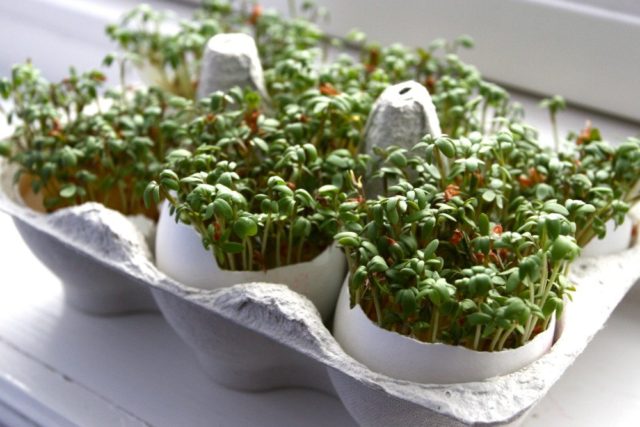
Even eggshells can act as a container for planting.
The soil can be bought at any specialty store, or you can prepare the mixture yourself by mixing in equal proportions soil, humus and river sand.
Preparation of planting material
Preliminary preparation requires not only containers and soil, but also planting material. Store-bought watercress seeds are poured into a glass or cup and covered with warm water. This is necessary in order for each seed to form a shell. After holding 3-5 seconds, the material is fished out with a teaspoon and gently spread on top of the soil or substrate.
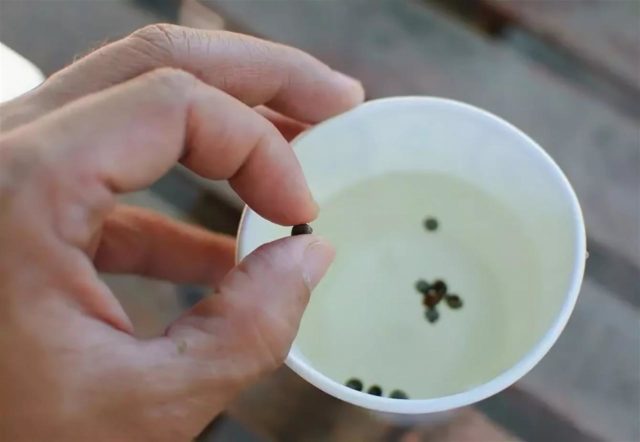
Pre-soaking the seeds allows you to identify defects
Self-collected seeds should be pre-soaked in a manganese solution. The floating specimens are unsuitable for sowing, but the settled ones are washed well in running water and used for planting.
Rules for planting watercress on the windowsill
The bottom of the container is drained using fine expanded clay or a special mesh, then soil is covered with a thickness of 6-7 cm and shallow grooves are laid at a distance of 10-12 cm.
The next step is sowing. This procedure is carried out using a teaspoon or simply pouring water with seeds soaked in it into a container so that they lie along the grooves in a relatively even layer.
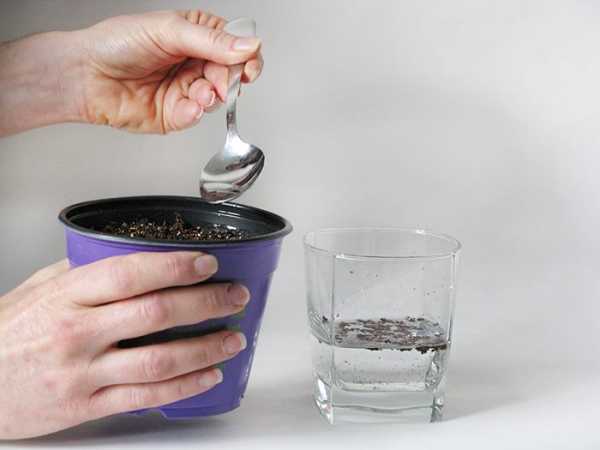
Sowing watercress is easier with a spoon
Then everything is sprinkled with a thin layer of soil. The latter is optional.
Next, the container is covered with cling film and left for 1-2 days on the windowsill.
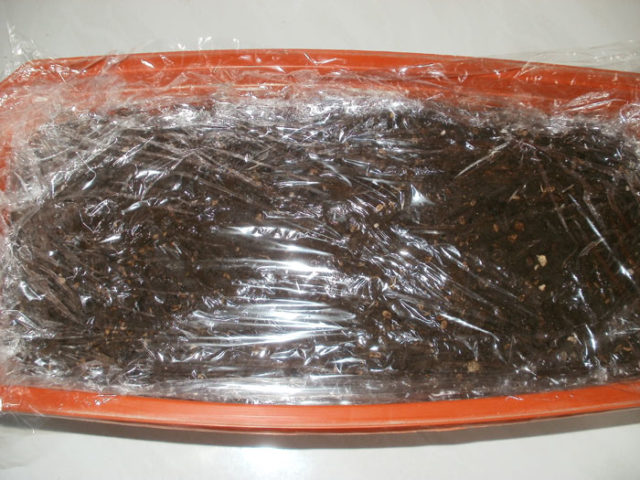
Covering with cling film allows you to maintain a comfortable temperature
The procedure for sowing into a substrate is practically the same. However, if sawdust or shavings act as a substrate, then they are first scalded with boiling water in order to avoid the development of mold.
A day later, the planting is checked. By this time, the first tender sprouts can already be observed. On the second day, the cling film is removed.
Care
Caring for watercress growing on a windowsill is extremely simple and includes organizing regular watering, feeding and visual observation. An excellent result can be obtained only by creating optimal conditions for growing this type of salad.
Optimal growing conditions
For beginners to grow watercress on a windowsill in winter, it is important to create a microclimate that is comfortable for the culture, which takes into account the indicators of temperature, humidity and degree of lighting.
Watercress is classified as a cold-resistant crop, as it germinates already at + 5 ° C. The optimal regime for the first shoots is 12-18 ° C. After 6-7 days, the temperature indicators are brought to 20-21 ° C, and no longer increase, since at a temperature of 25 ° C, the taste of the salad deteriorates (it begins to taste very bitter).
The watercress grown on the windowsill has enough natural light from the window. If possible, it is better to place containers with sprouts in the southern parts of the house or apartment.
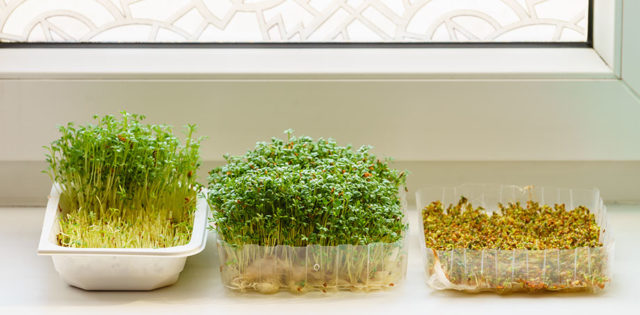
Watercress does not require additional artificial lighting
The culture loves moisture and requires constant moisture. Spraying from a spray bottle is enough to maintain the desired level of humidity on the windowsill.
Watering
Watercress is very moisture-loving. Even a short-term drought can lead to the death of the entire crop.Starting from the moment the first shoots appear and until the collection period, the plant on the windowsill is regularly sprayed with settled water at room temperature.
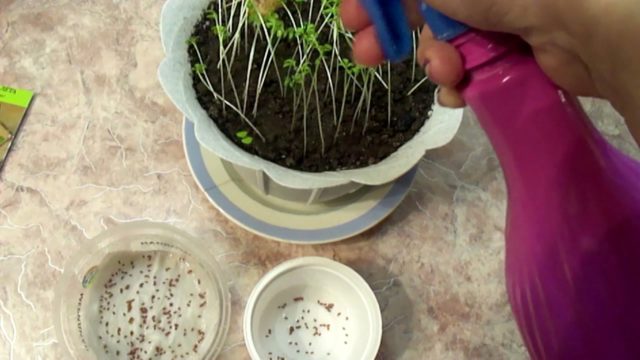
For spraying, use only settled water
Top dressing
8 days after the first shoots of watercress emerge, you can make top dressing. To do this, make a solution of nitroammophoska at the rate of 5 ml per 10 liters of water. Salad is regularly watered with this solution. However, if the plant shows good and fast growth, then it should not be fertilized again.
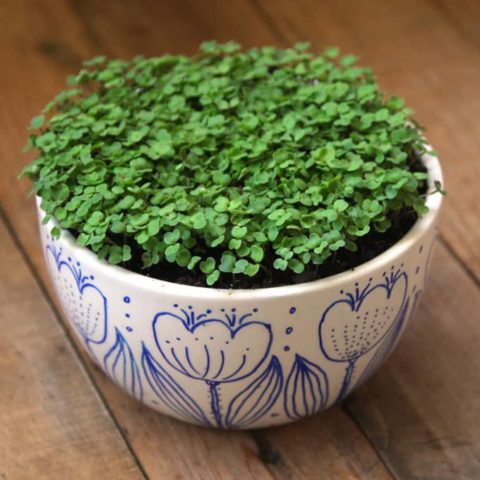
Top dressing is carried out no earlier than a week after the first shoots
Useful Tips
Harvesting is necessary at exactly the time specified for the variety. The sprouts that have reached a height of 10-13 cm are considered the most delicious. The harvest of watercress is carried out in the morning or evening hours, when the plant is in a state of turgor.
Overgrown watercress loses its taste. The sprouts acquire unnecessary stiffness and an unpleasant bitter aftertaste. Also unsuitable for use are shoots that have fired arrows. They not only lose in terms of taste, but also become poorer in chemical composition, becoming less useful.
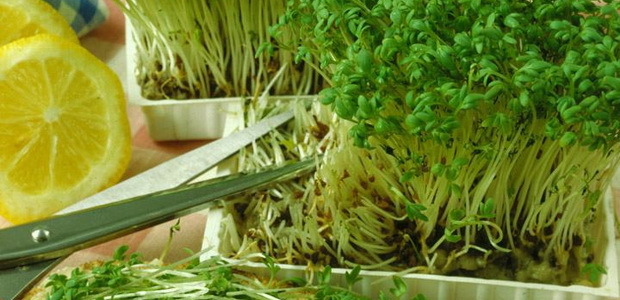
You can cut the salad as soon as the shoots reach 12-13 cm in height.
You can get the maximum yield and excellent tasting properties using a number of helpful tips:
- Too thick plantings of watercress on the windowsill must be thinned out, no later than a week after sowing. Leaving more space between shoots will result in larger lettuce leaves.
- So that the watercress does not "lie down" towards the natural light from the window, the container on the windowsill must be regularly turned (daily by 40-45 °).
- Setting a low temperature in the first week of growth (12-16 ° C) helps to build a healthy root system, strengthen the stems without subsequent uncontrolled stretching.
Conclusion
Growing watercress on a windowsill is a simple process for growing greens at home at any time of the year. Despite a number of features, even people who have never been engaged in "home gardening" can actually implement this procedure.

